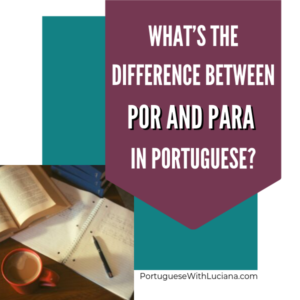 What’s the difference between por and para is one of the most asked questions by students and this is why I decided to write this guide. It has examples and exercises, so you can read and practice.
What’s the difference between por and para is one of the most asked questions by students and this is why I decided to write this guide. It has examples and exercises, so you can read and practice.
Por and para are prepositions and prepositions are crazy in any language. It’s something you have to keep studying and deepen over time. When you translate they don’t make sense, the differences between them when following the same verb can be subtle and hard to explain, as in fiz para você and fiz por você (explanation of these 2 are in the end of this blog post).
Uses of POR and PARA
POR
I’ll start by saying that you can contract por with definite articles o, a, os, as forming the words below:
Por + o – PELO
Por + a – PELA
Por + os – PELOS
Por + as – PELAS
So when I use pelo, pela, pelos, pelas in the examples, it’s the contracted form!
1. Time – duration or frequency
Marcos vai viajar por 6 meses. Marcos will travel for 6 months.
Karina faz aulas de Português três vezes por semana. Karina has Portuguese lessons 3 times a week.
2. Near, next to, inside a place, via, go past
Este ônibus passa pela Avenida Paulista? Does this bus go through Avenida Paulista?
Você pode passar pelo mercado na volta e comprar arroz? Can you go to the market on your way back and buy rice?
Fui para São Paulo por Campinas e não por Sorocaba. I went to São Paulo via Campinas, not via Sorocaba.
3. Reason (cause)
Ele faz muitas loucuras por amor. He does many crazy things for love (in the name of love).
Marina comprou 50 garrafas de água por medo de faltar água no meio da viagem. Marina bought 50 bottles of water because she was afraid there would lack water in the middle of the trip.
As crianças arrumaram o quarto por obrigação. The children tidy up the bedroom because they were obliged to.
4. Means of (by)
Manda o PDF por email não por WhatsApp. Send me the PDF by email, not WhatsApp.
Enviei os documentos por carta, pelos Correios. Devia ter mandado pela DHL. I sent the documents by letter, by Correios. I should have sent by DHL.
5. Price
Vendi o terreno por R$ 55.000,00. I sold the land for R$ 55.000,00.
6. Opinion
Por mim, não tem problema. Podemos ir pelo caminho mais longo. In my opinion, there is no problem. We can take the longest way.
7. Exchange (with verb trocar)
Troquei a camiseta verde pela azul. I exchanged the green T-shirt for the blue one.
Trocar seis por meia dúzia.
Trocar o certo pelo duvidoso.
The last 2 examples above are expressions. Trocar seis por meia dúzia means exchange six of one and half a dozen of the other and trocar o certo pelo duvidoso exchange means never give up certainty for hope.
8. Passive voice (when you mention the agent)
Este artigo foi escrito por mim. This article was written by me.
A hora da estrela foi escrito pela Clarice Lispector. A hora da Estrela was written by Clarice Lispector.
Structures with POR
It’s possible to use the same verb twice, second one on the infinitive linked by por, as in bebi por beber, or ele falou por falar and it means the action is not important. Comprei um caderno novo só por comprar porque já tenho vários. Comprei por comprar means I didn’t need a new notebook, but I saw it and bought it.
In this structure, por means after! Let’s see 2 examples: Andei rua por rua daquela cidade. It means I walked all the streets in that city, one after the other. Another one: li palavra por palavra do documento. It means that I read each word, one by one.
There are other uses for POR, but I selected these because I believe they are the ones students confuse the most.
PARA
There isn’t a contraction with PARA as there is with POR, but when we speak we say PRA, PRO and they mean:
Pra – PARA / PARA A
Pro – PARA O
Pras – PARA AS
Pros – PARA OS
Sometimes people cut it even more and it’s possible to hear pá.
1. Destination and direction.
Vou para casa. I go home
Este ônibus vai para São Paulo. This bus goes to São Paulo.
Ele caiu para trás. He fell to the back.
2. Intention or purpose
Saí às 8 para trabalhar. I left at 8 to work.
Comprei uma casa para morar. I bought a house to live.
Fui ao banco para resolver uns problemas. I went to the bank to solve some problems.
Esta câmera é para fotos e aquela, para vídeos. This camera is for photos and that one for videos.
3. Time (yes, again) – definite
Comprei comida para uma semana. I bought food for a week.
Quero viver nesta cidade para sempre. I want to live in this city forever.
Marquei uma aula para segunda. I booked a lesson for Monday.
4. Recipient
Chegaram flores para você. “Flowers arrived to you.”
Fiz este bolo de aniversário para você. I made this birthday cake for you.
5. Point of view
Esse filme é muito longo para mim. This movie is very long for me.
One expression with PARA
Para já! This expression means immediately. Preciso terminar a tarefa para já! I need to finish the homework immediately, right now!
Now, going back to the first 2 examples of this post: fiz para você and fiz por você. Fiz para você is number four above (recipient) and fiz por você can mean 2 things: I made it instead of, you were supposed to do it, but I did instead. Or I made something for love or affection. A typical use is: os pais fazem tudo pelos filhos. Parents do everything for their kids.
Activity with POR and PARA
Hope you had all your answers correct, but if you have questions, please use the space below to ask them!
Até a próxima!



